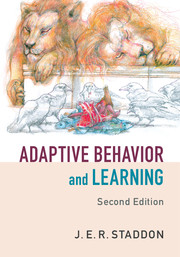Book contents
- Frontmatter
- Contents
- Preface to the second edition
- Acknowledgments
- 1 The evolution, development, and modification of behavior
- 2 Variation and selection: kineses
- 3 Reflexes
- 4 Direct orientation and feedback
- 5 Operant behavior
- 6 Reward and punishment
- 7 Feeding regulation: a model motivational system
- 8 The optimal allocation of behavior
- 9 Choice: dynamics and decision rules
- 10 Foraging and behavioral ecology
- 11 Stimulus control and cognition
- 12 Stimulus control and performance
- 13 Molar laws
- 14 Time and memory, I
- 15 Time and memory, II
- 16 Template learning
- 17 Learning, I
- 18 Models of classical conditioning
- 19 Learning, II
- 20 Learning, III: procedures
- 21 Comparative cognition
- Index
14 - Time and memory, I
Published online by Cambridge University Press: 05 March 2016
- Frontmatter
- Contents
- Preface to the second edition
- Acknowledgments
- 1 The evolution, development, and modification of behavior
- 2 Variation and selection: kineses
- 3 Reflexes
- 4 Direct orientation and feedback
- 5 Operant behavior
- 6 Reward and punishment
- 7 Feeding regulation: a model motivational system
- 8 The optimal allocation of behavior
- 9 Choice: dynamics and decision rules
- 10 Foraging and behavioral ecology
- 11 Stimulus control and cognition
- 12 Stimulus control and performance
- 13 Molar laws
- 14 Time and memory, I
- 15 Time and memory, II
- 16 Template learning
- 17 Learning, I
- 18 Models of classical conditioning
- 19 Learning, II
- 20 Learning, III: procedures
- 21 Comparative cognition
- Index
Summary
Memory is the most protean term in psychology. There are many kinds, apparently: long- and short-term memory; explicit and implicit memory; working and reference memory; episodic, semantic, event and procedural memory; primary and secondary memory. The plethora of terms suggests that the subject is not well understood. There is still no consensus on what we mean by memory, or on its relation to learning. I will try to make a few explicit connections in this chapter.
Chapter 5 defined memory/learning simply as a change of state caused by a stimulus: Memory is involved if how the animal behaves at time t2 depends on whether event A or event B occurred at previous time t1. Breaking a leg is a change of state in this sense, of course; it certainly will change future behavior. So we need to restrict the definition to effects that are specific and to some extent reversible: The difference in behavior at t2 should bear some sensible, informational relation to the difference between prior events A and B; and we should be able to change the effect by additional experience. Habituation, dishabituation, spontaneous recovery (“reminiscence”), and, particularly, control of behavior by elapsed time are all related to memory in this sense.
Much is known about timing in conditioning experiments. This chapter reviews the properties of temporal control and derives some general principles about the discrimination of recency. The next chapter shows that these principles also apply to more traditional situations used to study memory in animals, such as successive discrimination reversal, delayed matching to sample, and the radial-arm maze.
Temporal control
A PBS Nova TV program aired in 2014 introduced viewers to Jazz, a Hungarian Vizsla dog, belonging to a Scottish family of regular habits. Jazz seems to tell time. Every day at about 4:30 pm, he leaps up on to the sofa and looks out for Johnny, who always comes home at 5:00. It is as if he has a clock that tells him the time to expect the boss. How does he do it? Perhaps it was Johnny's wife, Christine, who comes home at 4:00, an hour earlier? Did Jazz just takes his cue from that? Or does Jazz really have some kind of internal clock?
Information
- Type
- Chapter
- Information
- Adaptive Behavior and Learning , pp. 398 - 420Publisher: Cambridge University PressPrint publication year: 2016
